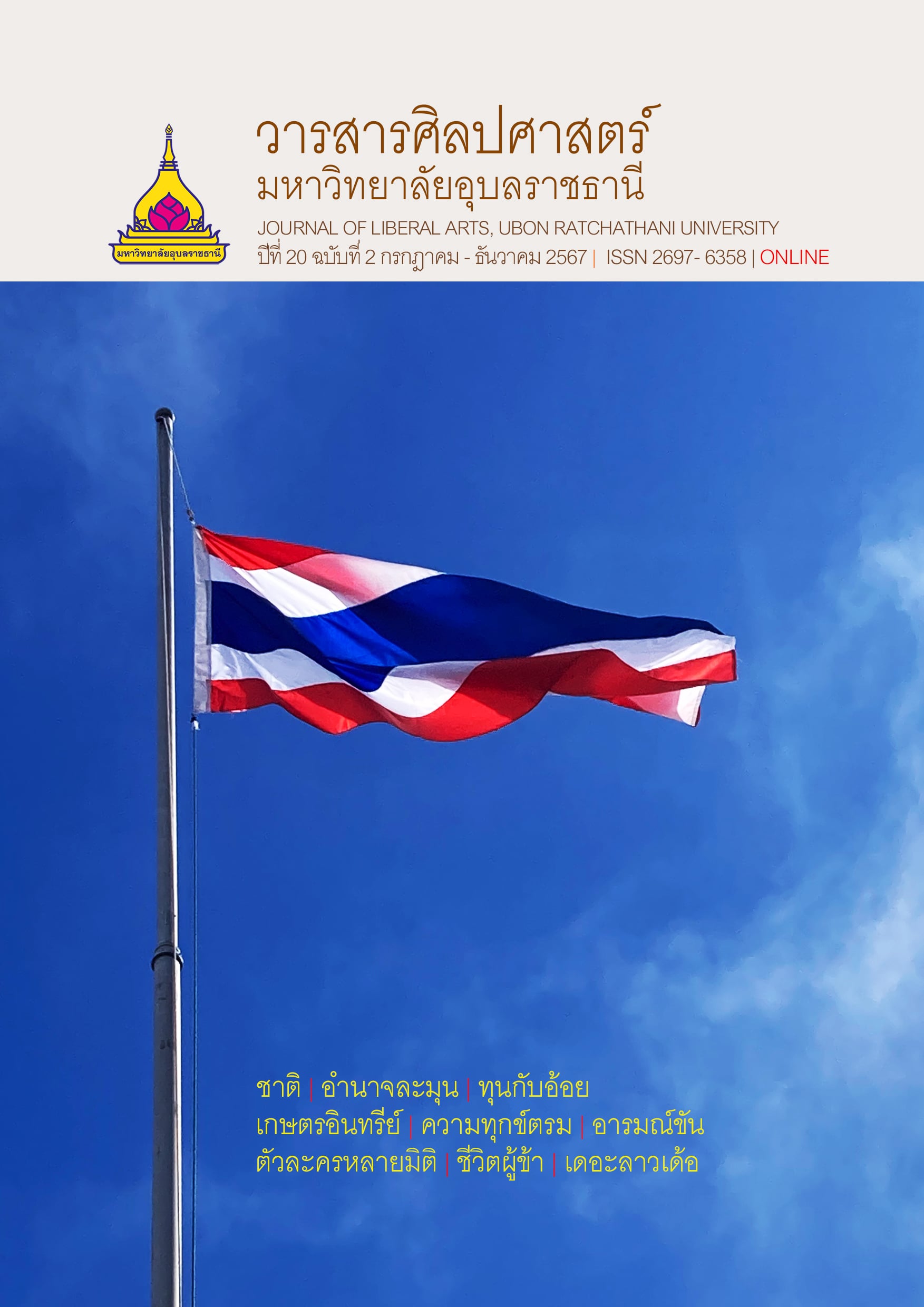มองไร่อ้อยแต่ไม่ได้เห็นแค่ “อ้อย”: เครือข่ายอ้อยจังหวัดมุกดาหารในมนุษยสมัยจากมุมมองทางภูมิศาสตร์มนุษย์
Main Article Content
บทคัดย่อ
การทำความเข้าใจวิกฤติของระบบนิเวศด้วยมโนทัศน์มนุษยสมัยมักตั้งคำถามจากความรู้ในลักษณะของศาสตร์แบบผู้เชี่ยวชาญและอธิบายปัญหาวิกฤติเชิงนิเวศโดยมุ่งเป้าไปที่มนุษย์ทุกคนอย่างเหมารวม อีกทั้งปัญหาที่เกิดขึ้นในอุตสาหกรรมการเกษตรอ้อยในปัจจุบันก็ถูกนำเสนอต่อสาธารณชนในลักษณะเช่นเดียวกับการนำเสนอวิกฤติของระบบนิเวศด้วยมโนทัศน์มนุษยสมัย บทความนี้ต้องการเปิดพื้นที่ในการแลกเปลี่ยนคำอธิบายเพื่อแสวงหาความเป็นไปได้ใหม่ในการทำความเข้าใจปัญหาที่กำลังเผชิญอยู่ในสังคมและระบบนิเวศ โดยมีวัตถุประสงค์เพื่อศึกษากระบวนการประกอบสร้างเครือข่ายอ้อยจังหวัดมุกดาหารในความสัมพันธ์ระหว่างมนุษย์และธรรมชาติและศึกษาเครือข่ายอ้อยจังหวัดมุกดาหารในฐานะส่วนหนึ่งของปรากฏการณ์ในมนุษยสมัย โดยนำแนวคิดภูมิศาสตร์แบบโลกพันทางและมโนทัศน์ยุคสมัยแห่งทุนมาใช้ในการทำความเข้าใจข่ายใยความสัมพันธ์ในลักษณะวัฒนธรรมชาติที่ผู้กระทำการทั้งที่เป็นมนุษย์และไม่ใช่มนุษย์มีปฏิบัติการร่วมกันในแต่ละพื้นที่และเวลาที่เปลี่ยนแปลงไปนำไปสู่การทำความเข้าใจกระบวนการประกอบสร้างเครือข่ายอ้อยจังหวัดมุกดาหาร โดยใช้การวิจัยเชิงคุณภาพในการศึกษา เก็บรวบรวมข้อมูลด้วยวิธีการสัมภาษณ์เชิงลึก การสังเกตการณ์ การสนทนากลุ่ม และการศึกษาเอกสารเพื่อนำมาวิเคราะห์ข้อมูลด้วยวิธีการวิเคราะห์เนื้อหา
จากการศึกษาพบว่า กระบวนการร่วมกันประกอบสร้างเครือข่ายอ้อยจังหวัดมุกดาหารของมนุษย์และที่ไม่ใช่มนุษย์มีเป้าประสงค์เพื่อให้อุตสาหกรรมการเกษตรอ้อยสามารถเข้ากับเงื่อนไขแบบเสรีนิยมใหม่และปรากฏการณ์ที่กำลังเกิดขึ้นในเครือข่ายอ้อยจังหวัดมุกดาหารเป็นภาพสะท้อนของการเปลี่ยนแปลงภูมิทัศน์ทางการเกษตรในจังหวัดมุกดาหารที่มีลักษณะของยุคสมัยแห่งการเกษตรแปลงใหญ่ ซึ่งไปกันได้ดีกับมโนทัศน์ยุคสมัยแห่งทุน
Downloads
Article Details

อนุญาตภายใต้เงื่อนไข Creative Commons Attribution-NonCommercial-NoDerivatives 4.0 International License.
เอกสารอ้างอิง
Aiemueayut, S. (2016). The Sensory Turn and its Contributions to Understanding the Contemporary Culture. [in Thai]. Chiang Mai: Faculty of Fine Arts, Chiang Mai University.
Bakker, K. (2015). Neoiberalization of Nature. In T. Perreault, G. Bridge, & J. McCarthy (Eds.), The Routledge Handbook of Political Ecology. London: Routledge.
Barua, M., Ibáñez Martín, R., & Achtnich, M. (2023, January 24). Introduction: Plantationocene. https://culanth.org/fieldsights/introduction-plantationocene
Chonsathien, N. (5 October 2023). Multi-Species and the Domestication process. [in Thai]. https://www.sac.or.th/portal/th/article/detail/527
Chuengsatiansup, K. (2016). Science-Nonscience: Anthropology at the Ontological turn. In C. Charoensri (Ed.), Science, Non-science: Come in Outside, Go out Inside. [in Thai]. Bangkok: Paragraph.
Ganjanapan, A. (2021). Beyond Discourse into Knowledge Space: the Intersection of Social Science Debates. [in Thai]. Bangkok: Sayam.
Hall, D. (2011). Land grabs, land control, and Southeast Asian crop booms. The Journal of Peasant Studies, 38(4), 837-857.
Hantrakool, P. (1999). Economics of Sugarcane and Sugar: Historical Studies Aspect. In P. Pongrapeeporn (Ed.), Interdisciplinary of Sugarcane and Sugar. [in Thai]. Bangkok: mitrphol sugar co. ltd.
Hutangkura, T. (2021). Anthropocene: A time when Humans Fluctuate Around the World. In Kengkij Kitirianglarp (Ed.), Anthropocence: Criticism of Humanity and Environmental Crisis in Capitalocene. [in Thai]. Bangkok: Princess Maha Chakri Sirindhorn Anthropology Centre (Public Organisation).
Jaksuwan, P., & Vaddhanaphuti, C. (2020). Line of life between macaques and the macaque caretakers: towards posthuman spaces of dwelling and becoming. [in Thai]. Social Sciences Academic Journal, Faculty of Social Sciences, Chiang Mai University, 32(2), 11-36.
Kitiarsa, P. (2014). Isan Becoming: Agrarian Change and the Sence of Mobile Community in Northeastern Thailand. [in Thai]. Bangkok: Vibhasa.
Kitirianglarp, K. (2021). Capitalocene: Anthropocene Debate in the World of Marxist Academics. In Kengkij Kitirianglarp (Ed.), Anthropocence: Criticism of Humanity and Environmental Crisis in Capitalocene. [in Thai]. Bangkok: Princess Maha Chakri Sirindhorn Anthropology Centre (Public Organisation).
Kosaikanont, R. (2013). Bitter Sugar, Economics, International Politics Regarding Cross-Border Capital within the Context of Mekong Sub-Region Economic Cooperation. In Y. Santasombat, & et. al (Eds.), Mekong Subregion Beneath the Economic Quadrangle. [in Thai]. Chiang Mai: Center for the Study of Biodiversity and Local Knowledge for Sustainable Development, Faculty of Social Science, Chiang Mai University.
Lave, R. (2015). Political Ecology and Actor-Network Theory. In T. Perreault, G. Bridge, & J. McCarthy (Eds.), The Routledge Handbook of Political Ecology. London: Routledge.
Mintz, S. W. (1985). Sweetness and Power: the Place of Surgar in Modern History. New York: Penguin books.
Na Ranong, V., & et, al. (2018, July 31). A Consultation Study to Resolve the Dispute Settlement on the Sugar Industry between Brazil and Thailand in the World Trade Organization (WTO). [in Thai]. Retrieved from Thailand Development Research Institute (TDRI): https://tdri.or.th/wp-content/uploads/2022/06/Consultation-Study-to-Resolve-the-Dispute-Settlement-on-the-Sugar-Industry-between-Brazil-and-Thailand-in-the-Wold-Trade-Organization.pdf
Phuaphansawat, K. (2018). History and Politics of the “Losers”: James C. Scott’s Perspective on Domination, Power, and Resistance. [in Thai]. Chulalongkorn University Journal of Social Science, 48(2), 83-110.
Sangkhamanee, J. (2016). The (non)-Modernity of Science-Nonscience: Bruno Latour's Non-Objectivism, Non-Humanism, and Networks-Actors. In Chantanee Charoensri (Ed.), Science, Non-science: Come in Outside, Go out Inside. [in Thai]. Bangkok: Paragraph.
Sangkhamanee, J. (2021). Methodology in STS. In Yukti Mukdawijitra, & Chutchon Ajanakitti (Ed.), Post-Humanism Anthropology. [in Thai]. Bangkok: Princess Maha Chakri Sirindhorn Anthropology Centre (Public Organisation).
Serirak, N. (2021). Nature Conservation in Capitalocene: a Brief History and Ethnography of "Protected area". In Kengkij Kitirianglarp (Ed.), Anthropocence: Criticism of Humanity and Environmental Crisis in Capitalocene. [in Thai]. Bangkok: Princess Maha Chakri Sirindhorn Anthropology Centre (Public Organisation).
Sismondo, S. (2023). An Introduction to Science and Technology Studies. (P. Lertsatienchai, Trans.) [in Thai]. Bangkok: Illuminations Edition.
UN NEWS. (2023, July 27). Hottest July Ever Signals ‘Era of Global Boiling has Arrived’ Says UN Chief. Retrieved from UN NEWS: https://news.un.org/en/story/2023/07/1139162
Vaddhanaphuti, C. (2021). On Social life, Scientific and Technological Life, and Political Life of “Climate Change” in Anthropocene. In K. Kitirianglarp (Ed.), Anthropocence: Criticism of Humanity and Environmental Crisis in Capitalocene. [in Thai]. Bangkok: Princess Maha Chakri Sirindhorn Anthropology Centre (Public Organisation).
Vaddhanaphuti, C., & Phumnoi, R. (2018). Hybrid Geographies of River Basin, Fish and People of Baan Kong, Kong Krailat District, Sukhothai: A Human Geography Perspective. [in Thai]. Journal of Sociology and Anthropology, 37(2), 129-160.
Wannaphin, S. N., & Surattanakawikul, P. (1999). History of Sugar Production in Thailand. In P. Pongrapeeporn (Ed.), Interdisciplinary of Sugarcane and Sugar. [in Thai]. Bangkpk: Mitrphol sugar co. ltd.
Whatmore, S. (2002). Hybrid Geographies : Natures, Cultures, Spaces. London: SAGE Publications.
Whatmore, S. (2017). Hybrid Geographies: Rethinking the ‘Human’ in Human Geography. In K. Anderson, (Ed.), Environment: Critical Essays in Human Geography. London: Taylor and Francis.
Wittayapak, C. (2018). Human Ecology: Environment Studies in the Dimensions of Society and Culture. [in Thai]. Chiang Mai: Office of Research Administration, Chiang Mai University.
Wongyannava, T. (2020). For Michel Foucault, Is a 'Hamburger' Really Delicious?. In Pipat Pasutarnchat (Ed.), Foucault and Neoliberalism. [in Thai]. Bangkok: Illuminations Editions.
World Integrated Trade Solution. (2019). Sugars; Cane Sugar, Raw, in Solid form, not Containing Added Flavouring or Colouring Matter Exports by Country in 2019. https://wits.worldbank.org/trade/ comtrade/en/country/ALL/year/2019/tradeflow/Exports/partner/WLD/product/170111
Interview
Pi Khai (pseudonym). Sugarcane Farmer in Mukdahan Province. Interview, 6 April 2022.
Aunty Dang (pseudonym). Former Sugarcane Farmer in Mukdahan Province. Interview, 4 June 2022.
Pi Man (pseudonym). Sugarcane Plantation Worker in Mukdahan. Interview, 7 February 2022.
Pi Ying (pseudonym). Sugarcane Plantation Worker in Mukdahan. Interview, 7 February 2022.
Uncle Sak (pseudonym). Sugarcane Farmer in Mukdahan Province. Interview, 7 February 2022.
Mr. Sin (pseudonym). Representative of Sugar Factory. Interview, 3 March 2022.
Grandny Yim (pseudonym). Former Worker of Sugar Factory. Interview, 28 March 2022.
Pi Ruang (pseudonym). Former Worker of Sugar Factory, Currently, Sugarcane Farmer in Mukdahan Province. Interview, 4 June 2022.
Uncle Dee (pseudonym). Villager of Ban Pa Wa, Mukdahan. Interview, 4 June 2022.
Uncle Dang (pseudonym). Villager of Ban Khok Sung, Mukdahan. Interview, 21 June 2022.
Aunty Maung (pseudonym). Villager of Ban Khok Sung, Mukdahan. Interview, 21 June 2022.
Pi Nuan (pseudonym). Government Official of Agricultural Research and Development Center. Interview, 6 April 2022.


